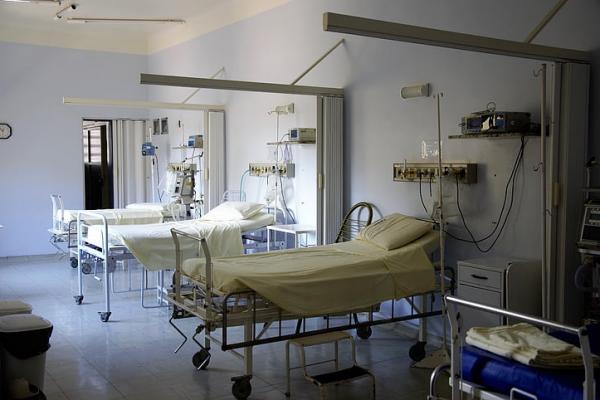GMB London call for NHS to roll out doubling intensive care capacity across the country

At the best of times capacity was stretched and more intensive care beds will bring NHS nearer to the comparable position in other countries says GMB.
GMB London commented on media reports that the NHS is aiming to double intensive care capacity in London. See notes to editors below for copy of the report in FT on 21st May.
Gavin Davies, GMB London Regional officer for the health and care sector, said:
"GMB London welcome this report that the NHS is aiming to double the number of intensive care beds in London in the wake of the Covid 19 emergency.
“At the best of times the capacity was stretched and more intensive care beds will bring UK nearer to the comparable position in other countries.
“The NHS should not stop at London. Increasing the number of intensive care beds should be rolled out to other parts of the country too.
“At the same time the NHS and Parliament should examine the scope for management in the NHS to be further devolved to local level with input from staff in the wake of the first phase of the public health emergency.
“The public has fully demonstrated their total confidence in the frontline NHS and care staff. The management of the NHS at local level can only benefit from more direct input from these magnificent staff into the running of local health and care services "
End
Contact Gavin Davies on 07930 983376 or press office 07921 289880
Notes to editors:
Copy of report in FT dated 21st May:
London’s hospitals aim to double intensive-care bed capacity
Capital’s NHS draws up plans for navigating a second wave of coronavirus without mass cancellation of other treatment
The NHS is planning to double the number of critical-care beds in London, in a move designed to help hospitals navigate a second coronavirus wave without mass cancellation of other treatment. The UK’s taxpayer-funded health service entered the pandemic at the start of March with far fewer intensive-care beds than most comparable nations.
Capacity was rapidly scaled up, with other beds adapted to treat the most seriously ill patients, and the field-style Nightingale hospitals constructed to cope with any overflow. But health leaders who struggle year-round to meet demand, with operations regularly postponed even in normal times, have drawn up plans aimed at finding a permanent solution to the shortfall.
According to two people familiar with the discussions, the number of critical-care beds in the capital will double, to a total of 1,650 within six months. The plans, drawn up by the NHS London region and being considered by national leaders, also envisage about 1,100 “surge” beds which could be made available within 48 hours if needed.
The extra beds would be concentrated in the larger London teaching hospitals, one of the people said. The Treasury has yet to authorise the necessary capital expenditure, however. A capital settlement for the NHS is expected to form part of the public expenditure round due later this year.
The plan will make fresh demands on the NHS’s already overstretched workforce. For every 100 critical-care beds, about 33 consultants are needed, along with about 28 critical-care doctors and 385 nurses. There are currently more than 40,000 nursing vacancies across the country.
While London’s plans are the most advanced, all NHS regions have been asked to submit blueprints to restore normal services now that coronavirus has passed its peak. According to the government, there are currently just over 10,000 people in hospital with Covid-19, a fall of 17 per since last week.
March, Simon Stevens, NHS England chief executive, ordered hospitals to cancel all non-urgent operations by no later than April 15 in order to preserve beds for coronavirus patients. The measures ensured that UK hospitals were never overwhelmed in the same way as those in parts of Italy and Spain.
But the health service is now facing a huge backlog, with an estimated 6m patients awaiting treatment. Explaining the urgent timetable for expanding bed numbers, one health leader said: “We don’t know whether there will be a next peak of the virus but it could occur in August, September or October, so we don’t have a lot of time.” The imperative is to ensure that, if a second wave struck, the NHS would be able to avoid shutting down some services. “We can keep coping with the coronavirus surge but, unlike last time, we would be able to continue with other work. We must never again have to cancel operations,” he added.
An NHS spokesperson said: “NHS staff pulled out all the stops to rapidly put in place 'surge' treatment capacity for coronavirus, and fortunately that has meant that everyone who needed emergency care over the past three months, whether for Covid or otherwise, has been able to receive it. “Now we are through the first peak of the virus, each part of the NHS has been asked to begin bringing back other services, while maintaining enough flexible critical-care capacity should it again be needed. We expect this may mean a permanent increase in critical-care staffing and facilities, and work is under way to map this out for the year ahead, and beyond.”
According to the King’s Fund think-tank, the total number of NHS hospital beds in England has more than halved over the past 30 years, from about 299,000 in 1987/88 to 141,000 in 2018/19, while the number of patients treated has increased significantly. Unlike most other categories of hospital bed, the total number of critical-care beds has increased in recent years. But the UK still languishes towards the bottom of European league tables relative to its population.


